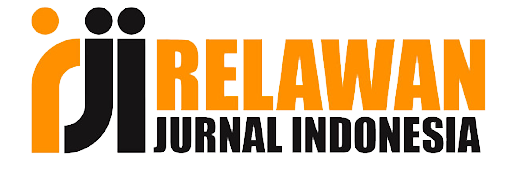Hubungan antara Anonimitas dan Moral Disengagement dengan Perilaku Cyberbullying pada Penggemar K-Pop yang Melakukan Fanwar
Abstract
This study is a quantitative study that aims to determine the relationship between anonymity and moral disengagement with cyberbullying behavior in K-Pop fans who do fanwar. Purposive sampling was used in sampling so that 250 K-Pop fans filled out the cyberbullying scale, anonymity scale, and moral disengagement scale. The results of the analysis show that there is a relationship between anonymity and moral disengagement with cyberbullying behavior in K-pop fans who do fanwar with a correlation coefficient of 0.413 and a p value <0.001 (p <0.01) and an effective contribution of 17%. Anonymity is positively and significantly related to cyberbullying as indicated by a correlation coefficient of 0.271 and a p value of 0.001 (p < 0.01). Moral disengagement is positively and significantly related to cyberbullying as indicated by a correlation coefficient of 0.398 and a p value of <0.001 (p <0.01). The results indicate that anonymity and moral disengagement can increase individual participation in cyberbullying behavior. Structural Equation Modeling (SEM) analysis was conducted to assess the strength of aspects. The aspect of "Imbalance Power" in measuring cyberbullying, the aspect of "Lack of Identification" in measuring anonymity, and the aspect of "Moral Justification" in measuring moral disengagement have low loading factors, thus proving less effective in measurement in this research.
Penelitian ini merupakan penelitian kuantitatif yang bertujuan untuk mengetahui hubungan antara anonimitas dan moral disengagement dengan perilaku cyberbullying pada penggemar K-Pop yang melakukan fanwar. Purposive sampling digunakan dalam pengambilan sampel sehingga 250 penggemar K-Pop mengisi skala skala cyberbullying, skala anonimitas, dan skala moral disengagement. Hasil analisis menunjukkan bahwa terdapat hubungan anonimitas dan moral disengagement dengan perilaku cyberbullying pada penggemar K-pop yang melakukan fanwar dengan koefisien korelasi 0.413 dan nilai p < 0.001 (p < 0.01) serta sumbangan efektif sebesar 17%. Anonimitas berhubungan positif yang sangat signifikan dengan cyberbullying ditunjukkan dengan koefisien korelasi 0.271 dan nilai p 0.001 (p < 0.01). Moral disengagement berhubungan positif yang sangat signifikan dengan cyberbullying ditunjukkan dengan koefisien korelasi 0.398 dan nilai p < 0.001 (p < 0.01). Hasil penelitian menunjukkan bahwa anonimitas dan moral disengagement dapat meningkatkan partisipasi individu dalam perilaku cyberbullying. Analisis Structural Equation Modeling (SEM) dilakukan untuk mengukur kekuatan aspek. Aspek “Ketidakseimbangan Kekuatan” dalam mengukur cyberbullying. Aspek “Kurangnya Identifikasi” dalam mengukur anonimitas, dan Aspek “Justifikasi Moral” dalam mengukur moral disengagement memiliki loading factor yang rendah sehingga kurang efektif melakukan pengukuran dalam penelitian ini.
Keywords
Full Text:
PDFReferences
Amichai-Hamburger, Y. (2017). Internet psychology: The basics. Routledge.
Ardis, N., Khumas, A., & Nurdin, Muh. N. H. (2021). Fenomena fanwar remaja perempuan penggemar K-Pop di media sosial terindikasi akibat perilaku fanatik. Motiva: Jurnal Psikologi, 4(1), 42–49.
Ayundari, K. W., & Perbawani, P. S. (2021). Dinamika online persona akun anonim twitter penggemar KPop. Jurnal Media dan Komunikasi Indonesia40, 2(1), 40–54. https://doi.org/10.22146/jmki.63068
Bandura, A. (2002). Selective moral disengagement in the exercise of moral agency. Journal of Moral Education, 31(2), 101–119. https://doi.org/10.1080/0305724022014322
Barlett, C. P. (2019). Predicting cyberbullying: Research, theory, and intervention. Academic Press. https://doi.org/10.1016/C2018-0-00531-9
Barlett, C. P., Seyfert, L. W., Rinker, A. M., & Roth, B. R. (2022). The moderating role of dispositional fear of retaliation in cyberbullying perpetration processes. Personality and Individual Differences, 196, 111731. https://doi.org/10.1016/j.paid.2022.111731
Bjärehed, M. (2022). Individual and classroom collective moral disengagement in offline and online bullying: A short-term multilevel growth model study. Psychology in the Schools, 59(2), 1–20. https://doi.org/10.1002/pits.22612
Boardley, I. D., & Kavussanu, M. (2011). Moral disengagement in sport. Dalam International Review of Sport and Exercise Psychology, 4(2), 93–108. https://doi.org/10.1080/1750984X.2011.570361
Booth, P. (2016). Digital fandom 2.0: New media studies (2 ed.). Peter Lang.
Cho, K. H. (2016). A study on the present status and future development of K-Pop: K-Pop entry strategies in the US and Europe markets based on successful cases of K-Pop in Japan and China [Tesis]. Kyunghee University.
Clark-Gordon, C. V., Bowman, N. D., Goodboy, A. K., & Wright, A. (2019). Anonymity and online self-Disclosure: A meta-analysis. Communication Reports, 32(2), 98–111. https://doi.org/10.1080/08934215.2019.1607516
Duffett, M. (2013). Understanding fandom: An introduction to the study of media fan culture. Bloomsbury Publishing.
Eklund, L., von Essen, E., Jonsson, F., & Johansson, M. (2022). Beyond a dichotomous understanding of online anonymity: Bridging the macro and micro level. Sociological Research Online, 27(2), 486–503. https://doi.org/10.1177/13607804211019760
Ghozali, I. (2018). Aplikasi analisis multivariate dengan program IBM SPSS 25 (9 ed.). Badan Penerbit Universitas Diponegoro.
Hasibuan, N. S. (2022). Hubungan moral disengagement dengan perilaku cyberbullying pada remaja pengguna media sosial (studi pada salah satu SMAN di Pekanbaru) [Skripsi]. Universitas Islam Negeri Sultan Syarif Kasim Riau.
Heirman, W., & Walrave, M. (2008). Assesing concerns and issue about the mediation of technology in cyberbullying. Cyberpsychology : Journal of Psychocial Research on Cyberspace, 2(2), 1–12.
Internet Governence Forum. (2013). Global perspectives on online anonymity.
Jenkins, H. (2018). Fandom, negotiation, and participatory culture. Dalam P. Booth (Ed.), A companion to media fandom and fan studies (hlm. 13–26). Wiley-Blackwell. https://doi.org/doi/10.1002/9781119237211.ch1
Khedun-Burgoine, B., & Kiaer, J. (2023). Korean wave in world englishes: The linguistic impact of Korea’s popular culture. In Korean Wave in World Englishes: The Linguistic Impact of Korea’s Popular Culture. Routledge. https://doi.org/10.4324/9780429200410
Kowalski, R. M., Giumetti, G. W., Schroeder, A. N., & Lattanner, M. R. (2014). Bullying in the digital age: A critical review and meta-analysis of cyberbullying research among youth. Psychological Bulletin, 140(4), 1073–1137. https://doi.org/10.1037/a0035618
Kurnia, A. (2017). Fenomena akun anonim di media sosial sebagai sumber informasi dan ekonomi (Analisis wacana pada akun instagram lambe turah). Journal Communication Spectrum: Capturing New Perspectives in Communication, 7(2), 180–189.
Law, D. M., Shapka, J. D., Hymel, S., Olson, B. F., & Waterhouse, T. (2012). The changing face of bullying: An empirical comparison between traditional and internet bullying and victimization. Computers in Human Behavior, 28(1), 226–232. https://doi.org/10.1016/j.chb.2011.09.004
Leung, L. Y. M. (2017). #Unrequited love in cottage industry? Managing k-pop (transnational) fandom in the social media age. In T. J. Yoon & D. Y. Jin (Ed.), The korean wave: Evolution, fandom, and transnationality. Lexington Books.
Lin, S., & Xiao, B. (2023). The relationship between paranoid tendencies and cyberbullying among Chinese adolescents: The mediating role of moral disengagement. Behavioral Sciences, 13(2), 102. https://doi.org/10.3390/bs13020102
Luo, A., & Bussey, K. (2022). Mediating role of moral disengagement in the perpetration of cyberbullying by victims and bystanders. Journal of Adolescence, 94(8), 1142–1149. https://doi.org/10.1002/jad.12092
Moore, D. S., Notz, W. I., & Fligner, M. A. (2013). The basic practice of statistics (6 ed.). W. H. Freeman and Company.
Patchin, J. W., & Hinduja, S. (2012). Cyberbullying: An update and synthesis of the research. Dalam J. W. Patchin & S. Hinduja (Ed.), Cyberbullying Prevention and Response: Expert Perspectives (hlm. 13–35). Routledge. https://doi.org/10.4324/9780203818312
Putri, A. F. R., Santosa, H. P., & Yusriana, A. (2022). Analisis dinamika komunikasi kelompok penggemar K-Pop generasi ke-4 (STAY, ATINY, dan MOA) dalam menanggapi fanwars di media sosial twitter. Interaksi Online, 10(4).
Robson, C., & Witenberg, R. T. (2013). The influence of moral disengagement, morally based self-esteem, age, and gender on traditional bullying and cyberbullying. Journal of School Violence, 12(2), 211–231. https://doi.org/10.1080/15388220.2012.762921
Samsiah, A. N., & Sumaryanti, I. U. (2023). Pengaruh anonimitas terhadap perilaku cyberbullying pada remaja akhir di Bandung. Bandung Conference Series: Psychology Science, 3(1), 366–372. https://doi.org/10.29313/bcsps.v3i1.5362
Sanchez, M. T. (2016). Cyberbullying, general strain theory, and the moderating effect of anonymity in college students [Tesis]. Kennesaw State University.
Sandrila, W., & Wahyunengsih. (2023). Motives of cyberbullying behavior by teenage K-Pop fans on twitter social media. Jurnal Riset Rumpun Ilmu Sosial, Politik dan Humaniora (JURRISH), 2(2).
Schaefer, U., & Bouwmeester, O. (2021). Reconceptualizing moral disengagement as a process: transcending overly liberal and overly conservative practice in the field. Journal of Business Ethics, 172(3), 525–543. https://doi.org/10.1007/s10551-020-04520-6
Slonje, R., Smith, P. K., & Frisén, A. (2012). Processes of cyberbullying, and feelings of remorse by bullies: A pilot study. European Journal of Developmental Psychology, 9(2), 244–259. https://doi.org/10.1080/17405629.2011.643670
Suler, J. (2004). The online disinhibition effect. Cyberpsychology & Behavior, 7(3), 321–326.
Szczyglowski, K. (2018). Empathy suppressing the facilitative effects of anonymity on cyberbullying. Western Undergraduate Psychology Journal, 6(1).
Tazkiyah, I., Fadillah, A. R., Kusuma, F. W., Siswantoro, F. M., & Cahyono, A. S. (2021). Peran anonimitas terhadap cyberbullying pada media sosial. SITASI: Seminar nasional teknologi dan sistem informasi, 3(2), 77–83.
Wardani, E. P., & Kusuma, R. S. (2021). Interaksi parasosial penggemar k-pop di media sosial (studi kualitatif pada fandom army di twitter). Jurnal Magister Ilmu Komunikasi, 7(2), 243–260.
Yulianti, W. (2022). Instagram sebagai media fan war penggemar k-pop. Jurnal PUBLIQUE, 3(1).
Zhao, L., & Yu, J. (2021). A meta-analytic review of moral disengagement and cyberbullying. Frontiers in Psychology, 12. https://doi.org/10.3389/fpsyg.2021.681299
Zubernis, L., & Larsen, K. (2018). Make space for us! Fandom in the real world. In P. Booth (Ed.), A Companion to Media Fandom and Fan Studies (hlm. 145–159). Wiley-Blackwell. https://doi.org/10.1002/9781119237211.ch9
DOI: https://doi.org/10.24176/perseptual.v8i2.11376
Refbacks
- There are currently no refbacks.

Jurnal Psikologi Perseptual (eISSN 2580-9520) is licensed under a Creative Commons Attribution-ShareAlike 4.0 International License














